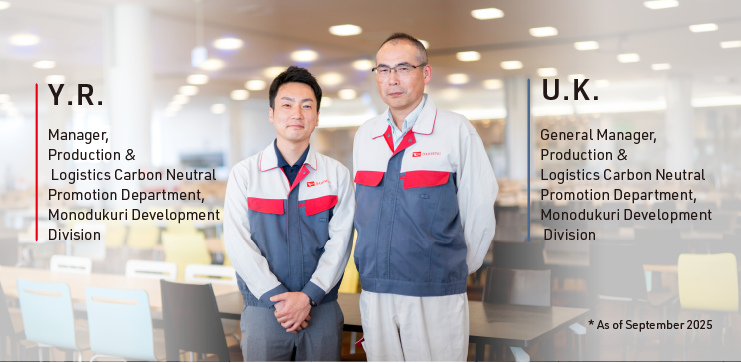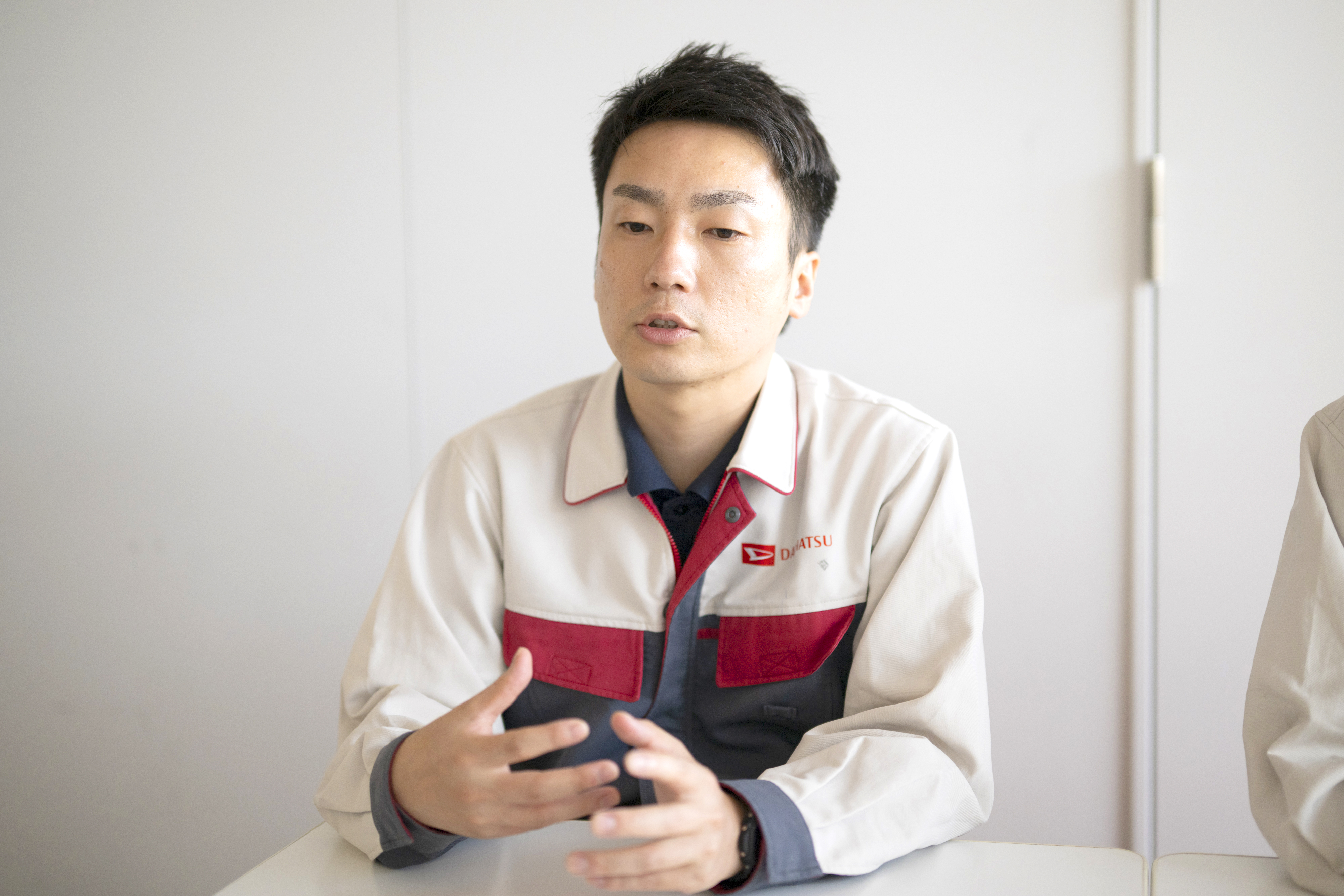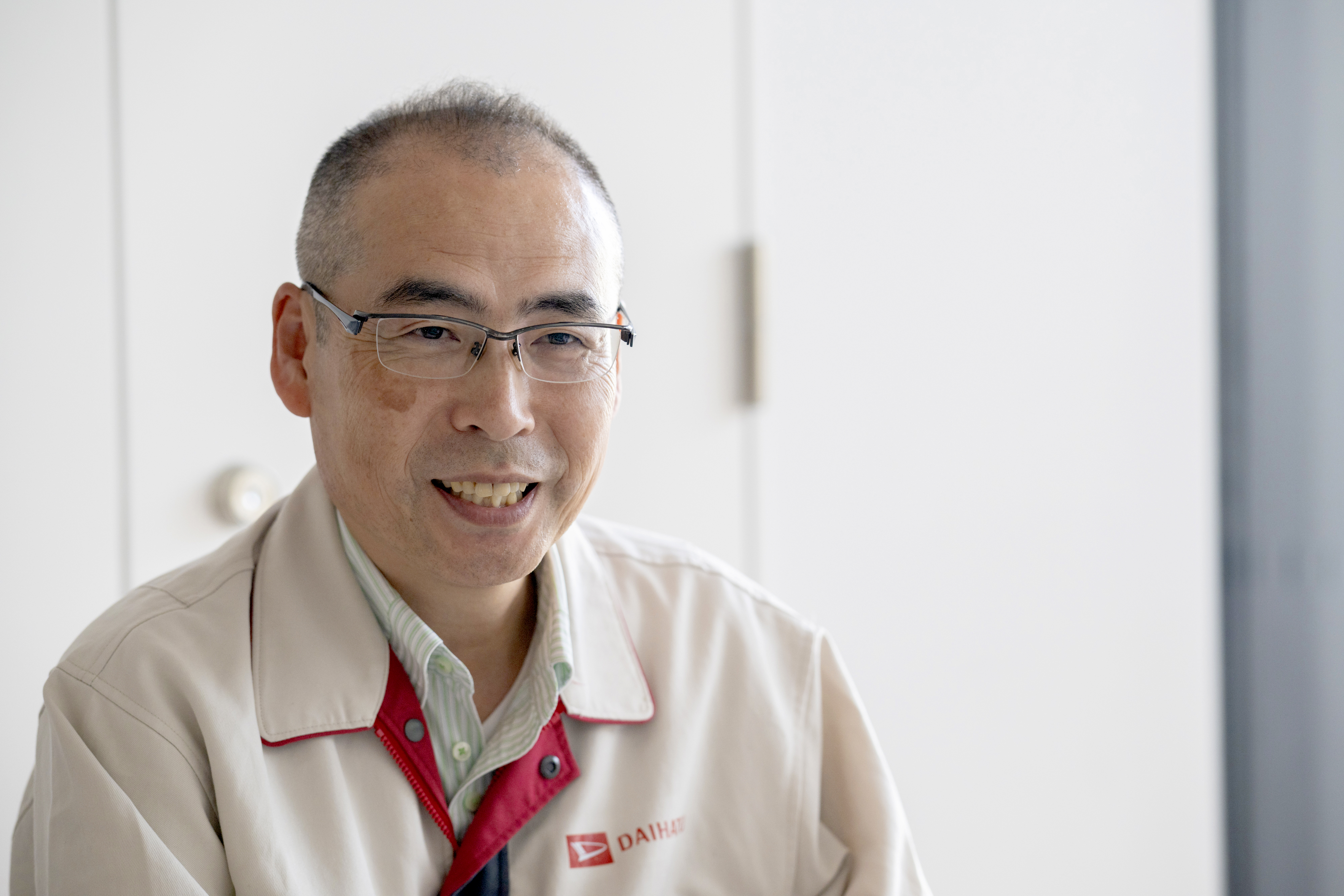Addressing Climate Change - 2

Embracing the Unique Daihatsu Way to
Achieve Carbon Neutrality in Production
The Daihatsu Group’s Leader in Carbon Neutrality
The Production & Logistics Carbon Neutral Promotion Department was launched in January 2022 as a Daihatsu Group-wide organization focused on achieving carbon neutrality (CN) by 2035. I then became General Manager of this department and began to oversee and lead initiatives for the entire Group, rather than just Daihatsu Motor itself.
Y.R:
I’m a member of the team, and am responsible for planning out our targets and path to achieving CN, as well as thinking about how to turn that into a viable business. We not only need to improve the environment, but also need to be profitable enough for our employees to enjoy comfortable lives. We will work with individual plants on action plans while aiming to strike a balance between these two aspects.
Daihatsu’s Unique Carbon Neutrality Based on SSC and the Multi-pathway Approach
Our goal is not carbon neutrality in the sense of “purchasing credits from others,” but rather an approach focused on Daihatsu’s unique qualities. This is based on our dogged pursuit of SSC (simple, slim, and compact), which is our manufacturing philosophy rooted in a business model focused on mini-vehicles. Rather than haphazard investment, we work to maximize our strengths, progressing simply and steadily forward. That is Daihatsu’s unique approach. We also incorporate Toyota’s “multi-pathway” approach, avoiding overreliance on external suppliers and striking a balance with in-house technology as we constantly search for optimal solutions.

Y.R:
I believe Daihatsu’s unique approach is “simple, steady improvement” and diligent effort towards energysaving activities. Rather than meeting targets through external purchases, we will change work sites ourselves. The effort itself is meaningful and is what makes the SSC mentality come alive. Our style is to experiment through trial-and-error in the field and take action ourselves.
Three Pillars of Initiatives
Y.R:
Since autumn 2024, the Daihatsu Group has begun holding regular meetings for presidents of Group companies in Japan and around the world. We hope to establish a venue for companies to share information about their current status and discuss problems they have been having in the work environment frankly and candidly. This is not working perfectly yet, but we are gradually cultivating a culture in which everyone can share their expertise and come together to move forward as a unified whole. It is the accumulation of these efforts that will strengthen the Group as a whole.
Team Culture That Doesn’t Flinch at Failure

U.K:
In team operations, we at Daihatsu prioritize face-to-face relationships. We currently have just 16 members on our team, so we can generally tell who is having issues just by looking around. This means that we can reach out directly and ask how they are doing through day-to-day conversation to discover if they are stuck
somewhere or having problems. I believe this is a unique strength of a team of this size. We are creating an environment in which everybody on the team feels they can be themselves at work.
I became a leader in January of this year, but there is still so much that I don’t know. However, U.K. often thanks me, and I am always so happy to hear that. This has inspired me to show my gratitude to my own team members more openly. Carbon neutrality is a major theme that is under a microscope, so we tend to be on guard on this issue. However, I would like to create an atmosphere in which everyone can enjoy the challenge without stiff formality. Even when something fails, it can serve as a useful experience for the future as long as it is treated seriously. I feel like this culture is gradually taking root in this team.
Working to Pass the Baton to the Next Generation in 2035
We are only ten years away until 2035. We don’t have much time left, so we can’t afford to stand still. However, we also shouldn’t just run ahead heedlessly. I think it is important for us to fully perceive the changes around us and skillfully incorporate those developments in a distinctively Daihatsu way. The world around us is changing at an incredible pace, and both nations and companies are zipping ahead, in Japan and around the world. We will grapple with these changes and apply them to our own unique style, in our own way. It is our responsibility and our mission to pass the baton forward to the next generation in this way, one reliable step at a time. We are always moving, but we take time to stop and look around. That is the determination that we take to our daily work.